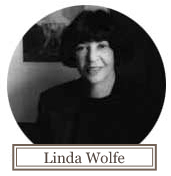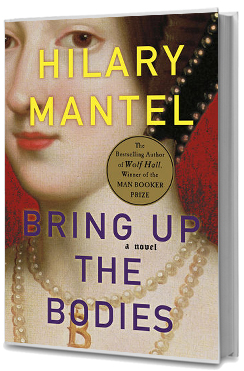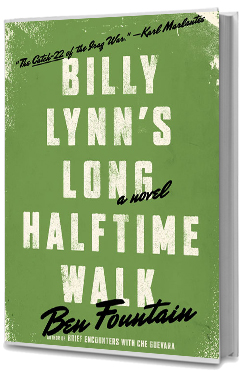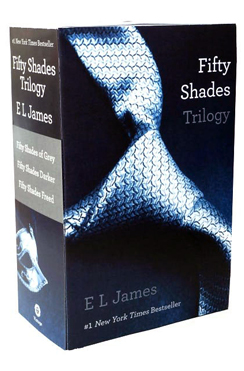 —————————————————————————————————
—————————————————————————————————
 We’re still only half way through the publishing year, but, I’m sure I can already tell you two books that will be on every reviewer’s ‘Best Books of 2012’ lists,” says FOF book critic Linda Wolfe, the award-winning author of 10 books and a 12-year veteran of the National Book Critics Circle. “[These books] are [also] sure to be nominees for the prestigious National Book Critics Circle fiction award: Bring Up the Bodies, Hilary Mantel’s glorious sequel to Wolf Hall, and Billy Lynn’s Long Halftime Walk, a stunning first novel by short story writer Ben Fountain.
We’re still only half way through the publishing year, but, I’m sure I can already tell you two books that will be on every reviewer’s ‘Best Books of 2012’ lists,” says FOF book critic Linda Wolfe, the award-winning author of 10 books and a 12-year veteran of the National Book Critics Circle. “[These books] are [also] sure to be nominees for the prestigious National Book Critics Circle fiction award: Bring Up the Bodies, Hilary Mantel’s glorious sequel to Wolf Hall, and Billy Lynn’s Long Halftime Walk, a stunning first novel by short story writer Ben Fountain.
“In addition, there are other bookish pleasures to be had this summer,” says Linda. “Books that will transport you, whether you’re off to some wondrous vacation destination or stuck sizzlingly at home.”
—————————————————————————————————
 BRING UP THE BODIES by Hilary Mantel
BRING UP THE BODIES by Hilary Mantel
Henry Holt. 410 pp.
I remember that when Mantel’s Wolf Hall came out in 2010, I read it very slowly, rationing myself to a score or so of pages a day to prolong the joy the book was giving me. Then, to my surprise, when I got within sixty pages of the end, I did something I hadn’t done since I was a pre-teen. I went back and read the book all over again, until finally, I finished it. Not without regrets. I’d wanted this work of galloping wit and invention never to end.
Like many women I know, I was more than a little in love with Mantel’s brilliant, complicated Thomas Cromwell, Henry VIII’s confidante and chief secretary, a statesman who was a humanitarian and social radical, a master of languages, an admirer of Latin poetry, and an adoring husband and father who could brandish a stiletto, cook up a gingery eel sauce, evaluate the worth of an oriental carpet, and stay loyal to his friends even when the rest of the world shunned them. So too, were a great number of women I knew, one of whom reminisced to me recently, “All day I couldn’t wait for it to be nighttime, so I could get in bed with Cromwell.”
Well, he’s back again, and he’s just as fascinating, albeit a little less loveable, for in Bodies, Mantel gives us the side of Cromwell–masked in the first book–that is capable of suppressing doubts and foregoing moral principles to hold onto power. He is dedicated to his master, the king, wants above all to serve Henry well and for his kingdom to prosper. “His greatest ambition for England is this,” Mantel tells us. “The prince and his commonwealth should be in accord. He doesn’t want the kingdom to be run like [his father] Walter’s house in Putney, with fighting all the time and the sound of banging and shrieking day and night. He wants it to be a household where everybody knows what they have to do, and feels safe doing it.” But, Henry has grown tired of his second wife, Anne Boleyn, with whom he had fallen so passionately in love that in order to divorce his first wife and marry Anne he had torn the kingdom away from Catholicism and started his own religion. Now, when Henry hints to Cromwell that he wishes to be rid of Anne, who has turned out to be not only a nag and a shrew, but has failed to produced a male heir to the throne, Cromwell thinks of his mentor, Cardinal Wolsey, who was forced from power, humiliated, and hounded to his death when he didn’t aid Henry to marry Anne. “To his inner ear, the cardinal speaks. He says, ‘I saw you…scratching your balls in the dawn and wondering at the violence of the king’s whims. If he wants a new wife, fix him one. I didn’t, and I am dead.’”
Cromwell will fix Henry a new wife, bringing Anne to trial on dubious charges of adultery and, using trumped-up evidence, causing her and a handful of implicated courtiers executed. But his efforts come at great cost. He has accumulated powerful enemies. But more importantly, he has deadened a part of himself. “He once thought,” he reflects, “that he might die of grief: for his wife, his daughters, his sisters, his father and master the cardinal. But the pulse, obdurate, keeps its rhythm. You think you cannot keep breathing, but your rib cage has other ideas, rising and falling, emitting sighs. You may thrive in spite of yourself; and so that you may do it, God takes out your heart of flesh, and gives you a heart of stone.”
Mantel, I’ve heard, had originally planned her sequel to follow Cromwell to his ultimate fall from power, but was persuaded to tell the story in three parts–the better to secure more book sales. I don’t care that Bring Up the Bodies stops short of the denouement. Now, I’ve got a third book to look forward to as eagerly as I awaited this one.
—————————————————————————————————
 BILLY LYNN’S LONG HALFTIME WALK by Ben Fountain.
BILLY LYNN’S LONG HALFTIME WALK by Ben Fountain.
Ecco. 307 pp.
Billy Lynn, Ben Fountain’s dazzling first novel, is bound for the literary peaks. It’s the Great American Novel of the twenty-first century so far, the Catch 22 of the Iraq war, the sweet spot where satire and heartbreak, scintillating language, unforgettable characters, and sharp-eyed insight into American life combine to make a book unlike any other you’ve read. Besides which, you’ll fall in love with Billy. He’s not Thomas Cromwell, but he’s quite a guy!
Billy’s just nineteen, a soldier in Iraq, who, with the ten members of his small squad, nicknamed Bravo, engaged in a fierce gun battle with insurgents that was taped by a Fox “embed” and broadcast on national TV. As the heroism of this small band of brothers goes viral through the culture, the Army quickly spots an advantage to bringing Billy and the eight surviving members of Bravo back home for a fourteen-day “Victory Tour.” A film producer latches onto them in the hopes of selling their story to Hollywood, members of the public go wild upon meeting them, pressing their flesh and spouting words like “terrRist, freedom, nina leven, currj, sacrifice,” and the owner of the Dallas Cowboys, a man named here as Norm Oglesby, arranges to have Bravo star–on the last day of their tour–in the stadium’s vaunted halftime spectacle, along with Beyoncé and Destiny’s Child.
A small town Texas boy who’d never left home before the war, Billy has by now, Thanksgiving Day, seen a great deal of America. “It’s the same everywhere Bravo has been,” he observes. “The airports, the hotels, the arenas and convention centers…retail dominates the land. Somewhere along the way, America became a giant mall with a country attached.” And in Iraq, Billy has seen things he could never have imagined, including the legs of Lake, one of the troop’s members, seeming to walk after the rest of the man has been blown apart from them. “What’s happening now isn’t nearly as real as that,” Billy thinks at the stadium. “The realest things in the world these days are the things in his head….A leg. Two legs. Lake’s…As if waking from a long sleep, the legs begin to stir. Tentative at first, they move with a childlike air of sweetly baffled innocence, but eventually they rise, shake themselves off and set off in search of the rest of Lake.”
Billy’s scared about having to return to Iraq. “The freaking randomness is what wears on you…the difference between life, death, and horrible injury sometimes as slight as stooping to tie your bootlace on the way to chow…turning your head to the left instead of the right. Random. How that shit does twist your mind.” He’s a kid, but his experiences have made him feel older than his age, wiser than his fellow Americans. “They are bold and proud and certain in the way of clever children blessed with too much self-esteem, and no amount of lecturing will enlighten them as to the state of pure sin toward which war inclines. He pities them, scorns them, loves them, hates them. These boys and girls. These toddlers, these infants. Americans are children who must go somewhere else to grow up, and sometimes die.”
He’s also desperate to find himself a girlfriend. The tour has provided him with a goodly dose of sexual experiences but he’s still a virgin, and he’s decided “Blow jobs suck, just by themselves. Well, sometimes they’re all right. Okay, usually they’re awesome as far as they go, but lately he feels the definite need for something more in his life. It’s not so much that he’s nineteen and still technically a virgin as it is this famished feeling deep in his chest, this liposucked void where his best part should be. He needs a woman. No, he needs a girlfriend, he needs someone to mash into body and soul and he’s been waiting for it to happen these entire two weeks.”
Ben Fountain, whose only previous book was the 2006 story collection, Brief Encounters With Che Guevara, has said that he conceived Billy Lynn while watching the halftime show of the Dallas Cowboys game on Thanksgiving Day 2004. “It was such a blithering, surreal, over the top mashup of patriotism and soft-core pornography that, once I actually started to pay attention to it, seemed emblematic of the general insanity of American life. One of the weirdest things was that everyone – the people in the stands, the TV announcers, the people I was with–didn’t see anything unusual about the show. It was just America being America. Couldn’t people see that the country was completely running off the rails? I was coming to the realization that I had no understanding whatsoever of the country where I was born and have spent my entire life. Billy Lynn is an attempt to gain some measure of understanding, or at least a reasonably accurate portrait of the current version of American psychopathy.”
That’s what Fountain has given us, and what happens to Billy during his hours at the stadium, the girl he finds, the decisions he has to make, and the new kinds of threats he must now fight, make for exciting, hilarious, chilling reading. This book will explode into your consciousness like an IUD.
—————————————————————————————————
 MÉNAGE by Alix Kates Shulman
MÉNAGE by Alix Kates Shulman
Other Press. 269 pages
If ever there was a perfect summer read, it’s this wicked romp by Shulman, author of four novels including the feminist classic, Memoirs of an Ex-Prom Queen. Ménage tells the tangled tale of a husband, his wife, and the total stranger the husband, on a whim, invites to live in his and his wife’s luxurious suburban home. His motives for this odd offer are complex. The stranger, an East European novelist now down-at-heels, was once the darling of the intellectual community here and abroad, spoken for by Sontag, lionized by the literati. The husband, Mack, a wealthy architect and collector of all the wondrous things money can buy thinks of the writer, Zoltan Barbu, as another possession, a celebrity whose residence in his home. Particularly, if while staying there, Zoltan completes the long-awaited masterpiece he’s said to have been working on for years, it will add to Mack’s own prestige. Moreover, his wife, Heather, is a would-be novelist; perhaps having Zoltan living with them will help her with her own writing; certainly it will provide her with the intellectual companionship Mack is too preoccupied with work and the occasional sexual escapade to offer her.
You think Heather might resent this “gift” of a live-in author? Uh-uh. She’s totally taken with the man from the moment she sees his “tall slim figure in a black cloak–dramatic, operatic” and especially when Zoltan, “adept at entrances,” kisses her hand, lightly brushing her knuckles with his lips and faintly teasing her arm “with the glossy lock that had fallen over his right eye.”
From there on in, you’ll be turning pages, bursting into laughter, scratching your head, absorbed in the antics of this engaging threesome–and how all of them ultimately get exactly what they want from their turbulent time together. A heady mix of lively dialogue, right-on social observation, and fun-pokes at literary pretension and suburban life, this novel is full of surprises.
—————————————————————————————————
 The SHADES OF GREY Trilogy by E.L. James. Vintage.
The SHADES OF GREY Trilogy by E.L. James. Vintage.
Shades of Grey. 382 pages
Fifty Shades Darker. 395 pages
Fifty Shades Freed. 468 pages
SPOILER ALERT: This review contains information about the ending of each book in the Shades of Grey trilogy.
It looks like everyone who is thirty and fabulous has read the Shades of Grey trilogy, and I suspect that many a fifty and fabulous woman has already done so. But, for those of you who are still catching up, let me add my voice to the great E.L. James clamor. The woman can write. She’s not a particularly good stylist–her sentences are flat, even dull, her descriptions of characters tend to involve merely a mentioning of someone’s eye color. But when it comes to sex scenes, she’s detailed and graphic, and besides the hot stuff, she’s got a wonderful mystery going, one that keeps the pages flying by. Innocent but spunky Anastasia Steele–her name says it all–is swept off her feet by gorgeous, entrepreneurial Christian Grey, who supports humanitarian causes but has sexual appetites that make Ana uncomfortable. He’s into S&M sex, albeit in a corporate sort of way. In Book One, he proffers Ana a lengthy contract specifying activities that are essential to his pleasure, like spanking, whipping and cuffing, but which allows her to indicate the specific types of canes, whips, and restraints she would like to consider off-limits. This legalistic sexual dominator is a) young – only twenty-six years old and b) rich – he has his own (vaguely described) cutting-edge technology and shipping company. The mystery is: what has made this paragon of a man weird in the bedroom (or in the“Playroom” where he keeps his exotic erotic equipment)?
Ana takes him on, and the plot of the tale is one that women have adored for centuries. Think Lord Rochester in Jane Eyre, Heathcliff in Wuthering Heights, Maxim de Winter in Rebecca – the kind of man who seems haughtily aloof or fiercely moody but who in fact has a heart of gold, the kind of man whose external defenses can be breached and whose tormented soul can be psychologically repaired by a good woman’s love. In Book Two, Ana rescues Christian from the demons that have pursued him ever since his abusive early childhood, and yes, dear reader, she marries him. In Book Three, despite complications like quarrels over Ana’s career goals and the attempt by a villainous book editor to destroy Christian, the couple lives happily ever after. Still having hot sex, but of a more loving and consensual kind.
The books are sheer fun, and if you haven’t read them, put them on your “To Do” list. For laters, baby, as Christian would say.

3 Responses to “{FOF Book Critic} Not-to-be-missed summer fiction”
Ellen says:
As a critic of exquisite taste, you always offer great recommendations, but allow me to quibble over “Fifty Shades of Grey.” Call me a prude, but any novel with a dangling modifier on the first page is going to dim its chances, no matter what else dangles later on. And the whole domination thing left my feminist heart cold.
Linda Wolfe says:
No, the book should cheer your feminist heart. Ana takes the reins of the relationship, and shows Christian how exciting a loving and consensual sexual relationship can be.
Linda says:
Read the first “Grey” and can’t wait for my daughter to finish the next two. Very much a summer “at the pool” book.